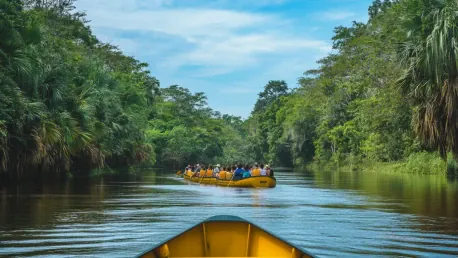The travel industry is witnessing a significant shift, driven by a growing demand for sustainable, authentic, and immersive travel experiences. North America is leading this ecotourism boom with remarkable growth rates and innovative eco-friendly initiatives, reshaping how travelers and businesses approach tourism, and emphasizing responsibility, conservation, and community benefits. This transformation is not only changing traveler behavior but also driving economic opportunities for local communities, promoting sustainability, and providing a blueprint for global travel trends.
A Global Shift Towards Sustainability
Increased awareness of environmental issues such as climate change and habitat destruction is changing traveler preferences. Modern adventurers are now seeking experiences that minimize environmental impact and promote local community well-being. Ecotourism, with its focus on nature-based activities and ethical practices, is perfectly positioned to cater to this demand. This shift is global, with travelers from various regions prioritizing sustainable travel options. By choosing ecotourism, they are supporting wildlife conservation and eco-friendly travel initiatives that benefit local economies. The trend towards ecotourism signifies a broader movement within the travel industry, where conscious travelers prioritize destinations that emphasize green practices. As this trend continues to flourish, businesses and tourism boards worldwide are encouraged to adopt sustainable initiatives, further accelerating the shift towards eco-friendly travel.
One of the primary drivers behind this global shift is the increased understanding of the impact of traditional tourism. Mass tourism often leads to environmental degradation, loss of biodiversity, and negative socio-economic effects on local communities. In contrast, ecotourism aims to create harmony between travelers and nature, ensuring that the environmental footprint is minimal and local communities are respected and benefited. This approach is resonating with an increasing number of travelers who are more informed and conscientious than ever before.
Economic Opportunities for Local Communities
Ecotourism’s rise is creating substantial economic benefits for local communities investing in sustainable infrastructure. Eco-lodges, protected nature reserves, and cultural tourism programs are fostering employment, conservation funding, and infrastructure development. The economic advantages of ecotourism are evident in regions where sustainable practices have been embraced, leading to a better quality of life for local populations and enhanced preservation of natural habitats. North America stands out with the highest projected growth rate in ecotourism, but other regions like Asia-Pacific and Latin America are also experiencing rapid expansion. Governments and tourism boards worldwide are promoting eco-friendly travel to harness these opportunities. By supporting ecotourism, destinations can tap into a lucrative market while ensuring long-term environmental and socio-economic sustainability. This dual benefit is crucial for the ongoing promotion and success of sustainable travel.
The ripple effect of economic benefits from ecotourism extends beyond just direct employment and infrastructure improvement. It fosters a sense of pride and ownership among local communities, encouraging them to actively participate in conservation efforts and sustainable practices. This involvement ensures that the natural and cultural heritage is preserved for future generations while simultaneously providing economic stability. Additionally, by promoting unique local cultures and traditions, ecotourism enhances the visitor experience, making destinations more appealing to a wider audience.
The Role of Travel Agents and Digital Platforms
Travel agents are gaining market share by offering customized and responsible tourism options. Travelers are increasingly turning to agencies specializing in sustainable travel, driving a steady growth rate in this segment. The personalized approach of travel agents, combined with their expertise in curating eco-friendly itineraries, makes them valuable partners in the journey towards sustainable travel.
Digital platforms are also playing a critical role by enabling easy booking of eco-friendly accommodations, carbon-offset travel options, and connections with conservation projects. With advancements in technology, these platforms are set to revolutionize the ecotourism market. From AI-powered recommendations to virtual eco-tours, technology is making it easier for travelers to make sustainable choices effortlessly.
The synergy between travel agents and digital platforms creates a seamless experience for eco-conscious travelers. While agents provide the human touch and personalized service, digital platforms offer convenience and accessibility. This combination ensures that travelers have access to the best of both worlds, empowering them to make informed and responsible travel decisions. Furthermore, technology’s role in promoting transparency through blockchain-based certifications and real-time conservation updates reinforces trust and accountability within the ecotourism sector.
Expanding the Definition of Ecotourism
Traditional ecotourism activities like wildlife viewing and hiking are expanding to include diverse experiences such as community-based tourism and sustainable culinary tours. Adventure sports, including eco-friendly kayaking, diving, and zip-lining, are also gaining popularity. This expansion of ecotourism’s scope helps attract a variety of travelers, from adventure seekers to cultural enthusiasts and luxury tourists.
As the definition of ecotourism broadens, tour operators are innovating to offer unique and immersive experiences that go beyond conventional activities. Community-based tourism, for instance, allows travelers to engage directly with local cultures, participating in traditional activities and supporting local artisans. Sustainable culinary tours highlight regional cuisine made from locally sourced ingredients, offering a taste of authenticity while promoting sustainable practices in the food industry.
This broadening of ecotourism’s scope promotes visitor satisfaction and higher revenues for destinations committed to sustainable practices. By catering to a wider range of interests, destinations can attract more travelers and encourage repeat visits. Additionally, the diverse experiences offered under the ecotourism umbrella enhance the overall appeal of sustainable travel, making it accessible and enjoyable for everyone, regardless of their travel preferences.
Challenges in Sustainable Tourism
Despite these positive trends, significant challenges remain. Popularity in eco-travel may lead to overtourism, habitat degradation, and commercialization of indigenous cultures. Addressing these issues requires strict environmental regulations and community-led conservation initiatives. Ensuring that the rapid growth of ecotourism does not compromise the very environments it aims to protect is essential for long-term sustainability.
Eco-tourism operators and governments are emphasizing sustainable visitor management and ethical tourism policies to mitigate negative impacts and ensure long-term sustainability. By implementing measures such as limiting visitor numbers, promoting off-peak travel, and engaging visitors in conservation efforts, stakeholders can balance the demand for ecotourism with the need to preserve natural and cultural resources. Collaboration between operators, governments, and local communities is crucial to achieve these goals.
Furthermore, raising awareness among travelers about the principles of responsible tourism is vital to overcoming these challenges. Educating tourists on minimizing their environmental footprint, respecting local cultures, and supporting conservation efforts helps create a more conscientious traveler base. Initiatives such as carbon offset programs, eco-friendly accommodations, and ethical tourism practices can play a significant role in addressing the challenges of sustainable tourism and ensuring that ecotourism continues to thrive without compromising its core values.
Strategy for Travel Professionals
The travel industry is undergoing a remarkable transition, driven by an increasing demand for sustainable, genuine, and immersive travel experiences. North America is at the forefront of this ecotourism surge, exhibiting impressive growth rates and pioneering innovative eco-friendly initiatives. These efforts are transforming how both travelers and businesses view tourism, with a heightened focus on responsibility, conservation, and community benefits. This shift is not only altering traveler behavior but also generating economic opportunities for local communities, fostering sustainability, and serving as a model for global travel trends. The dynamic nature of this change highlights the importance of eco-conscious practices in the tourism sector. By prioritizing environmental stewardship and authentic cultural exchanges, the travel industry is paving the way for a more sustainable future. As travelers seek deeper connections with nature and local cultures, the industry must continue to innovate and adapt, ensuring that ecotourism remains a driving force in shaping the future of travel.









